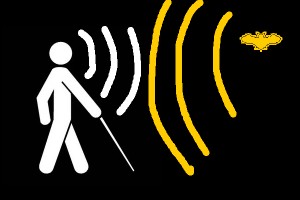 We’ve all heard that if you lose one sense you make up for it with another–but what about ecoloclation? In the current Men’s Journal Michael Finkel shows us how Daniel Kish, a blind genius, taught himself to ecolocate as a kid by making clicking sounds and listening to how they bounched back. Now he’s trying to teach other blind people the skill that lets him ride a bike and get around much more freely.
We’ve all heard that if you lose one sense you make up for it with another–but what about ecoloclation? In the current Men’s Journal Michael Finkel shows us how Daniel Kish, a blind genius, taught himself to ecolocate as a kid by making clicking sounds and listening to how they bounched back. Now he’s trying to teach other blind people the skill that lets him ride a bike and get around much more freely.
Finkel notes that other blind people have done it and scholars have known about it since at least 1749. In the 1940s Karl Dallenbach proved humans could ecolocate at Cornell. Yet remarkably little practical work has been done on human ecololation for the vast improvement it could make in the quality of life of the blind–not to mention enhanced perception for sighted humans. (You’d think, if nothing else, the military would do some research.)
Kish teaches Finkel a simple use of ecolocation. Kish posted on Men’s Journal that it could be widely adapted: “It is true that perhaps 10% take it to an extreme level, like bike riding through obstacles and such, but most are able to use it to increase their navigation abilities notably.”
What set Finkel apart was that he was set free to explore and develop the skill while other blind people are socially discouraged.
He came to it on his own, intuitively, at age two, about a year after his second eye was removed. Many blind children make noises in order to get feedback — foot stomping, finger snapping, hand clapping, tongue clicking. These behaviors are the beginnings of echolocation, but they’re almost invariably deemed asocial by parents or caretakers and swiftly extinguished.
A few scientists are working on the potential. New Zealand sonar expert Leslie Kay developed a device called Bat K-Sonar, that makes sounds from an attachment to a blind person’s cane and special headphones to hear the echoes. It uses bat-like, directional pulses that can distinguish distance and the kind of object.
But Kish, formed a group World Access for the Blind that methodically teaches the blind to ecolocate and is the most serious effort to date to put this long-forgotten human skill to use.
Finkel helpfully explains that you already use some form of ecolocation every time you hear the direction of a sound. Our hearing is much better than our sight, Finkel explains: “We can see less than one octave of frequency. We hear a range of 10 octaves.”
Now he’d like to experiment with bringing human ecolocation capabilities up to the bat level. Making bat clicking sounds is pretty easy with a machine. But the catch is getting the human ear to hear them. Kish thinks it could be done with an implant, but tragically doesn’t have the $16 million to try.
Actually, two boosts. We need a way to create batlike sound waves, and we need to be able to hear those waves. In pursuit of these goals, Kish has spent time in
“It becomes as ridiculous for blind people to run into a wall as it is for sighted people,” he once wrote in his FlashSonar manual.
Read about Boston University’s research on ecolocation
Check out World Access for the Blind
Look at Bat K Sonar

Good blog. Thanks for making my week.